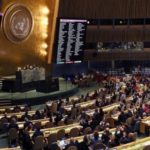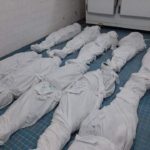Acting SRSG Stephanie Williams Briefing to the Security Council- 19 May 2020
Mr. President,
Members of the Security Council,
Let me open with best wishes to our Muslim colleagues on the occasion of the holy month of Ramadan. Allow me also to congratulate Estonia for its Presidency of the Security Council this month.
Mr. President,
I had hoped to be able to deliver a more positive report to you today but unfortunately, just when we think that the bottom has been reached in Libya, we somehow manage to achieve new depths of violence, heartlessness, and impunity. Despite our determined efforts and the Secretary-General’s plea for an immediate ceasefire to allow Libyans to respond to the common threat of COVID-19, I regret to report that there has been no lull in the fighting between the Government of National Accord (GNA) forces and General Haftar’s “Libyan National Army,” also known as the “Libyan Arab Armed Forces” (LAAF.) Instead, fighting has escalated with an unprecedented increase in indirect fire in urban areas and a growing tide of suffering for civilians.
For nearly 15 months following the launch of General Haftar’s attack on Tripoli in April of 2019, armed conflict has been raging in and around some of Libya’s most densely populated areas. As a result of the intensifying armed hostilities, coupled with the dire socio-economic impact of COVID-19 and including the loss of employment and livelihoods, a million people are now in need of some form of humanitarian assistance. This includes 400,000 internally displaced Libyans, along with 654,000 migrants, refugees and asylum seekers. In the last one year alone, since the attack on Tripoli started, 201,000 Libyans were forced to flee their homes, mostly in and around the capital.
While people around the world are adjusting to the new normal of living with a global pandemic, millions of Libyans – most notably the two million residents of Tripoli – are experiencing a most abnormal and terrifying existence, under almost constant bombardment, frequent water and electricity cuts and compounded by restricted movement as a result of preventive COVID-19 measures, rendering the whole situation unbearable for the majority to celebrate the holy month of Ramadan in peace. We continue to witness an alarming military build-up as a result of the uninterrupted dispatch by the foreign backers of increasingly sophisticated and lethal weapons, not to mention the recruitment of more mercenaries to both sides of the conflict.
After their successful bid to retake six cities on the coastal road west of Tripoli in April, GNA forces are now seeking to roll back the LNA’s foothold in southern Tripoli by forcing the redeployment of resources and disrupting their supply lines from the nearby city of Tarhouna. Emboldened by these recent successes, the GNA showed reluctance to reciprocate a unilaterally declared cessation of all military activities announced by the LNA on 29 April on the occasion of Ramadan. On 5 May, GNA forces initiated operations to seize control of the Wutiya airbase but were initially repelled by UAVs and snipers, resulting in dozens of fatalities. After repeated attempts, supported by multiple airstrikes conducted by drones, GNA forces took control of the airbase yesterday, on 18 May. The control of this strategic airbase may trigger further escalation, turning the Libyan conflict into a pure proxy war. As has been the case on a number of occasions, we witnessed the direct involvement of foreign parties in this operation, either with UAVs or the presence on the ground of air defence systems, in blatant violation of the arms embargo.
Since 24 April, Tripoli, and in particular Mitiga airport, has been subjected to nearly non-stop daily shelling. On 7 May, heavy-artillery bombardment and grad rocket attacks launched by pro-LNA forces impacted downtown Tripoli, including the seaport and in the vicinity of the Foreign Ministry, the Turkish embassy and the residence of Italy’s ambassador to Libya, with at least two civilians killed and three others injured. Another round of shelling on targets in and around Mitiga by General Haftar’s forces on 15 May hit three warehouses of the Central Committee for Municipal Elections, destroying a sizable amount of electoral material. Once again, we call for the immediate cessation of attacks against civilians and civilian infrastructure whilst calling on the GNA to restore the civilian nature of Mitiga airport.
Military operations in and around Tarhouna caused new displacement and negatively impacted humanitarian access to the city. I am concerned about GNA UAV attacks over the past two months on vehicles travelling between Mazdah and Tarhouna as well as in Bani Walid which caused collateral damage to vehicles carrying non-combat related items like food, goods, and fuel and resulted in civilian casualties.
Since my last briefing, the al Khadra Hospital which was assigned to receive patients infected with COVID-19, was hit on four separate days by LNA rockets, along with the Royal Hospital, the Field Medical Support Centre in Tariq al-Matar, and the Weryemma polyclinic, causing the facilities to be evacuated. On 16 May, shelling carried out by General Haftar’s forces struck a shelter for internally displaced persons and migrants in Tripoli’s al-Furnaj district. At least seven persons were killed and 17 injured, including women and children. This is not the first time this camp has been targeted. On 10 May, an armed group opened fire inside the intensive care unit in al-Jalla hospital in Benghazi, damaging equipment, while the Tripoli Central Hospital sustained damage as a result of LNA rocket attacks, launched by pro-LNA forces. I would be remiss not to reiterate that such attacks violate International Humanitarian Law and may amount to war crimes.
Between 1 April and 18 May, UNSMIL documented at least 248 civilian casualties (58 killed and 190 injured), an 89 per cent increase compared to the total civilian casualties recorded for the first three months of this year. The vast majority of the total civilian casualties are attributed to forces affiliated to the LNA. Those guilty of crimes under international law must be brought to justice.
We are also concerned by attacks on civilians, desecration of corpses, retribution, including looting, robberies and torching of public and private properties, in western coastal towns recently seized by GNA forces. On 14 April, following the GNA forces’ takeover of the city of Surman, the Martyr Othman Hamza Company, affiliated with the GNA, broke into Surman prison and unlawfully released 401 prisoners. In Tarhouna, on 5 April, the LNA-affiliated armed group 9th Brigade killed at least nine civilians and demolished seven houses, after forcibly evicting families from their homes and abducting seven women, whose fate remains unknown.
Social media is another theatre of the Libyan conflict. Building on the workshops we ran last year to stem incitement and the use of hateful rhetoric in the media, UNSMIL organized a virtual forum in April with nearly 30 prominent Libyan traditional and social media figures from across the spectrum. We were pleased to see the participants agree to establish a hate speech observatory under the auspices of UNSMIL and to produce a Code of Ethics.
Mr. President,
COVID-19 compounds existing insecurity in addition to exacerbating longstanding vulnerabilities. The UN System is hard at work to assist national authorities, including through the provision of supplies, equipment, and training. Testing capacity has been scaled up. There are now five operational laboratories in the country, up from two, but more are needed, including the qualified personnel to operate them.
As of 18 May, there were 65 confirmed cases, including three COVID-related deaths that were reported across Libya. According to WHO, the peak has not yet reached Libya and the risk of an intensification of the outbreak remains very high. It should also be noted that the low count of positive cases is proportional to the low testing capacity, contact tracing in the country, and fear of social stigmatization.
Although national authorities have provided frequent updates on financial pledges to address the COVID-19 pandemic, including on the purchase of medical equipment and the payment of salaries to medical workers, these have been slow to materialize and salaries to be fully paid. Local authorities across Libya face severe shortages of functioning hospitals, intensive care units, vital medical equipment, and supplies including personal protective equipment. According to a recent WHO survey, while 75 percent of primary health centres are open, only 20 per cent are delivering services.
Likewise, humanitarian actors face access constraints in moving humanitarian supplies into and around the country, and flights carrying medical supplies have not been able to land due to a lack of clearances in Benghazi. Negotiating clearances to operate during curfews due to COVID-19, as well as ongoing insecurity, have delayed relief distributions.
To mitigate the spread of COVID-19 and in response to advocacy from UNSMIL, I welcome the reported release by Libyan authorities of more than 2,000 prisoners and detainees between 25 March and 15 May. The Supreme Judicial Council, the Public Prosecution, and the Ministry of Justice demonstrated desire to protect prisoners and detainees from COVID-19 and we encourage them to release further prisoners particularly women and children, persons with disabilities, persons with medical conditions, older persons, migrants and refugees. With technical support and equipment provided by the United Nations, al-Jadideh Prison in Tripoli hosted several successful remote court-hearings between 15 and 30 April.
We remain very concerned about the situation of migrants and asylum seekers in Libya. Since January, more than 3,200 have been intercepted at sea and returned to Libya frequently to abusive conditions in detention, whilst others have disappeared altogether. UNSMIL is also concerned about the expulsions of at least 1,400 migrants and refugees this year from eastern Libya in violation of Libya’s international human rights law obligations on non-refoulement and collective expulsions, and the risk that more may soon be forcibly deported. We have received reports of the failure to assist and coordinated pushbacks of migrant boats in the central Mediterranean, which continues to be one of the deadliest migration routes in the world. Both Italy and Malta (and now Libya as well) have closed their ports to disembarkation of migrants rescued at sea, citing health concerns related to COVID-19. The stabilization of populations in Libya will only come, first and foremost, through an immediate ceasefire followed by a full return to political dialogue.
I would like to urge Member States to respond to our call for COVID-dedicated funding as well as to ramp up support to the 2020 Humanitarian Response Plan, which is seriously underfunded at 14 per cent. The lack of funding is hampering our ability to combat the pandemic as well as to ensure that existing vulnerabilities are not exacerbated.
Mr. President,
There is a risk that violence may expand in southern Libya as the conflict sharpens existing divisions. In the southern city of Sabha, the recently sworn-in elected municipal council was suspended after it made a statement supportive of the LNA on 26 April leading the GNA Ministry of Local Governance to replace it with an appointed Steering Committee. The elected council has filed an appeal of the GNA’s decision. I encourage the Government to engage in a constructive dialogue with the elected council in order to safeguard democratic processes in Libya. Municipal service delivery should be shielded from national politics.
We commend the perseverance of Libya’s local electoral committee officials who continue preparations to resume municipal council elections despite tremendous challenges. Another 38 local elections are planned to be held in 2020; municipal councils and the CCMCE are considering special measures to provide a safe environment for voting during the pandemic. Elections are planned in several municipalities in June and July, including in Misrata.
Excellencies,
The fighting, compounded with COVID-19 and the on-going oil blockade, pose an unprecedented challenge to the already fraught socio-economic situation in Libya. The blockade itself has already cost Libya over USD four billion. With a looming budget deficit of 26 billion dinars in 2020, the Central Bank of Libya has imposed austerity measures including limits on foreign exchange. All of this has led to a loss of income, food shortages and price spikes, including supply chain disruptions. The parallel market exchange rate has increased from 4.1 LYD to the US dollar in January to 6.1 today, which further impacts people’s purchasing power. Many of the gains from the economic reforms enacted in 2018 have been erased.
I have engaged both the Prime Minister and the Central Bank Governor to address the country’s financial crisis and encourage dialogue with the aim of implementing a series of reforms which will mitigate both the national deficit and improve the lives of the average Libyan. This month the Ministry of Justice delivered an encouraging ruling on the legality of the international audit.
Another worrying trend is the weaponization of vital services. Since the end of March there have been four incidents, two that cut water supplies from the Man-Made River and two that have cut natural gas supplies to electrical power plants. These acts are reprehensible at any time but particularly at a time when the country is suffering from the effects of war and a global pandemic.
In a positive development, on 3 May the National Oil Corporation (NOC) managed to restore the institutional integrity of the national fuel distribution company, Brega, by reunifying the Management Committee. We welcome this development as it maintains the impartiality and effectiveness of the NOC.
Mr. President,
I assure you that the United Nations will not relent in our effort to get Libya’s political and military leaders to assume their responsibilities and commit to a ceasefire and a political settlement. In the wake of recent military developments, it appears there may be a window for the rejuvenation of some political activity.
On 23 April, House of Representatives President Saleh announced a new political initiative, calling for the social and political constituencies representing the East, the West and the South to elect their own representatives to a three-member Presidency Council under the supervision of the UN. By contrast, on the same day, General Haftar regrettably reiterated that he considers the Libyan Political Agreement (LPA) and the current Presidency Council void and requested that Libyans choose an institution to lead the country for a transitional period. In a follow-up speech just four days later on 27 April, General Haftar “accepted” what he believes is a popular mandate for his General Command to play a greater governance role. On a more positive note, on 5 May, Prime Minister Serraj publicly welcomed all political initiatives that called for a peaceful solution to the Libyan crisis and urged all parties to resume political talks either within the framework of the LPA or via an agreement to hold elections under an agreed constitutional framework. Should the talks be held within the LPA framework, Mr. Serraj referred to the restructuring of the executive, including formation of a Presidency Council (PC) with three members, and a government headed by a prime minister.
We welcome the constructive stance taken by the Prime Minister and the HoR President and any political initiatives that are inclusive and aimed at ending the fighting and finding a peaceful solution to the conflict within the framework of the conclusions of the 19 January International Conference in Berlin and UNSCR 2510. Our mission remains to help Libyans rebuild a state strong enough to peacefully contain political differences.
We have engaged with the GNA and the LNA to build on the draft ceasefire agreement tabled at the 23 February 5+5 Joint Military Commission talks in Geneva. The Mission is analyzing comments on the draft agreement provided by the GNA team. We are still waiting to receive feedback from the LNA. I request your assistance to ensure that we receive a response at the earliest to resume these much-needed exchanges. The existing draft constitutes the most solid basis for a resumption of the discussion.
We appreciate the support expressed by participants to the Berlin Conference. In the same spirit, we hope to count on their backing to urgently stop the inflow of military support from abroad in violation of the UN arms embargo. The European Union launched a new Operation Irini on 1 April. We welcome all efforts to support the implementation of the UN arms embargo, in line with Security Council resolution 2292 (2016) and encourage Member States to contribute to its monitoring and implementation in a comprehensive manner.
We equally appreciate the interest of Member States and our Libya Quartet partner organizations to engage within the International Follow-Up Committee on Libya, which convened at the senior officials’ level on 2 April and 13 May. The raison d’être of the Committee is to ensure implementation of the Berlin commitments. Discussions have begun in the four thematic working groups established under the Committee. The groups form a critical tool to support UNSMIL, but also to demonstrate to the Libyans that the Berlin Conference can deliver on its promises.
Mr. President,
As we survey the carnage wrought by almost 15 months of unrelenting violence in Libya, I believe we have a reached another turning point in the conflict. From what we are witnessing in terms of the massive influx of weaponry, equipment and mercenaries to the two sides, the only conclusion that we can draw is that this war will intensify, broaden and deepen with devastating consequences for the Libyan people. As the foreign intervention increases, the Libyans themselves are getting lost in the mix, their voices crowded out. We must not let Libya slip away. We must enable responsible Libyans to write their own future. By coming together now, this Council can ensure the collective security it is mandated to maintain by applying consistent and credible pressure on those regional and international actors that are fueling the conflict. We can collectively write a different ending to this so far sad tale but only if we demonstrate a collective will to do so.
Thank you.




Leave a Reply
Want to join the discussion?Feel free to contribute!